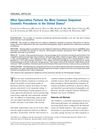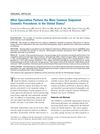Search
for
Sort by
Research
660-690 / 1000+ resultsresearch Genomewide Scan for Linkage Reveals Evidence of Several Susceptibility Loci for Alopecia Areata
Certain genes on chromosomes 6, 10, 16, and 18 may increase the risk of alopecia areata.

research Successful White Hair Removal with Combined Coloring and Intense Pulsed Light: A Randomized Clinical Trial
Coloring white hair before IPL treatment effectively helps remove it.
research Desmoglein 4 Mutations Underlie Localized Autosomal Recessive Hypotrichosis in Humans, Mice, and Rats
Mutations in the DSG4 gene cause fragile, sparse hair in humans, mice, and rats.

research Frontal Fibrosing Alopecia in Men: A Multicenter Study of 39 Patients
Most men with Frontal fibrosing alopecia also lose facial hair and the condition may be linked to hormone levels and sunscreen use.
research Varying Presentation of Type 1 Polyglandular Failure in India
In India, most patients with type 1 autoimmune polyglandular failure show symptoms in a specific order, starting with parathyroid gland issues, then yeast infections, and finally adrenal gland failure.

research Patchy Acute Effluvium in and Around the Donor Area Following FUE Hair Transplant and Its Predilection for Two-Day Sessions and High Graft Extraction Cases
More grafts and longer surgeries increase the risk of hair loss in the donor area after FUE hair transplants.

research Oral Supplementation With L-Cystine, Serenoa Repens, Pumpkin Seed Oil, And Pygeum Africanum In Chronic Telogen Effluvium And Androgenetic Alopecia: A Double-Blind, Placebo-Controlled, Randomized Clinical Study
The supplements improved hair density and reduced hair loss.

research Oral Supplementation with L-Cystine, Serenoa Repens, Cucurbita Pepo, and Pygeum Africanum in Chronic Telogen Effluvium and Androgenetic Alopecia: A Double-Blind, Placebo-Controlled, Randomized Clinical Study
The supplement significantly improves hair density and appearance in people with hair loss.

research Faculty Opinions Recommendation of Mesotherapy with Bicalutamide: A New Treatment for Androgenetic Alopecia
Bicalutamide mesotherapy improved hair density in women with hair loss and was well received.

research Faculty Opinions Recommendation of Treatment of Alopecia Areata with Nonablative Fractional Laser Combined with Topical Minoxidil
Combining nonablative fractional laser with minoxidil was effective for alopecia areata with only one patient relapsing after a year.

research Faculty Opinions Recommendation of Enhanced Effect of Platelet-Rich Plasma Containing a New Carrier on Hair Growth
Adding dalteparin and protamine microparticles to platelet-rich plasma can boost hair growth more than using platelet-rich plasma alone.

research Faculty Opinions Recommendation of the Effect of CD34+ Cell-Containing Autologous Platelet-Rich Plasma Injection on Pattern Hair Loss: A Preliminary Study
Injecting CD34+ cell-containing platelet-rich plasma can improve pattern hair loss more than placental extract treatment.

research Faculty Opinions Recommendation of Promising Therapies for Treating and Preventing Androgenic Alopecia
There are several promising treatments for hair loss, including dutasteride, latanoprost, ketoconazole shampoo, anti-androgens, laser/light treatment, and platelet-rich plasma, but more research is needed.
research Faculty Opinions Recommendation of Efficacy and Safety of Topical Finasteride Spray Solution for Male Androgenetic Alopecia: A Phase III, Randomized, Controlled Clinical Trial
research Faculty Opinions Recommendation of There Is a Positive Dose-Dependent Association between Low-Dose Oral Minoxidil and Its Efficacy for Androgenetic Alopecia: Findings from a Systematic Review with Meta-Regression Analyses
research Faculty Opinions Recommendation of Mesotherapy With Dutasteride for Androgenetic Alopecia: A Retrospective Study in Real Clinical Practice

research Faculty Opinions Recommendation of Review of Oral Minoxidil as Treatment of Hair Disorders: In Search of the Perfect Dose
Low-dose oral minoxidil is a promising, safe treatment for various hair diseases, improving hair thickness and density, but more research is needed on long-term side effects and treatment duration.
research Faculty Opinions Recommendation of Safety of Oral Bicalutamide in Female Pattern Hair Loss: A Retrospective Review of 316 Patients
research Faculty Opinions Recommendation of Safety of Low-Dose Oral Minoxidil for Hair Loss: A Multicenter Study of 1404 Patients
research Faculty Opinions Recommendation of Androgenetic Alopecia Present in the Majority of Hospitalized COVID-19 Patients – The 'Gabrin Sign'

research Faculty Opinions Recommendation of Minoxidil Dose Response Study in Female Pattern Hair Loss Patients Determined to Be Non-Responders to 5% Topical Minoxidil
60% of women who didn't respond to 5% minoxidil for hair loss showed significant improvement with a 15% minoxidil solution.
research Faculty Opinions Recommendation of Randomized Placebo-Controlled, Double-Blind, Half-Head Study to Assess the Efficacy of Platelet-Rich Plasma on the Treatment of Androgenetic Alopecia

research Clinical Utility and Validity of Minoxidil Response Testing in Androgenetic Alopecia
A hair test can accurately predict if a person with hair loss will respond to minoxidil treatment.

research Faculty Opinions Recommendation of Topical Valproic Acid Increases the Hair Count in Male Patients with Androgenetic Alopecia: A Randomized, Comparative, Clinical Feasibility Study Using Phototrichogram Analysis
Applying valproic acid on the scalp increased hair growth in men with hair loss.
research Faculty Opinions Recommendation of a Randomized, Active- and Placebo-Controlled Study of the Efficacy and Safety of Different Doses of Dutasteride Versus Placebo and Finasteride in the Treatment of Male Subjects with Androgenetic Alopecia

research Faculty Opinions Recommendation of Androgenetic Alopecia and Risk of Prostate Cancer: A Systematic Review and Meta-Analysis
Hair loss at the top of the head is linked to prostate cancer, but other types of hair loss are not.

research What Specialties Perform the Most Common Outpatient Cosmetic Procedures in the United States?
Dermatologists perform most outpatient cosmetic procedures in the U.S., especially on white women aged 40 to 59.

research What Specialties Perform the Most Common Outpatient Cosmetic Procedures in the United States?
Dermatologists performed the most outpatient cosmetic procedures in the U.S. from 1995 to 2003, especially on white women aged 40 to 59.

research Comparative Evaluation of Sonographic Ovarian Morphology of Indian Women with Polycystic Ovary Syndrome Versus Normal Women
Indian women with PCOS may need different ultrasound criteria for diagnosis than current standards.